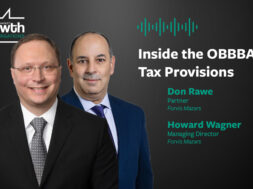Middle-Market Public Policy Roundup
Senate to vote on "skinny" stimulus, and lawmakers urge the Fed to expand MSLP for small and midsize companies.

UPDATE: After the roundup’s press time on Sept. 10, the Senate voted on its stimulus plan, which failed to gain enough votes to make it out of the chamber, killing the bill before it could reach the House. Additional federal relief is unlikely to come out of Congress before the November elections.
In this week’s roundup, we look at the Senate’s plans to vote on a new stimulus package bill this week. The proposal is expected to pass the Senate, but will face difficulty in the House. In addition, we provide a summary of a Senate committee hearing where lawmakers urged the Federal Reserve to expand access to its Main Street Lending Program for small and midsize companies. We also highlight the next meeting of the Securities and Exchange Commission’s Investor Advisory Committee.
Senate’s ‘Skinny’ Stimulus Faces Doomed Outcome
The Senate could vote on a coronavirus stimulus package as early as this week, Majority Leader Mitch McConnell, R-Ky., announced Tuesday.
The so-called “skinny” bill could come to vote as early as Thursday, when the bill is expected to pass the Senate. It is not likely to make it through the House.
No longer the flat $1 trillion HEALS Act proposal advanced by the Senate in August, the plan is now valued at “hundreds of billions,” according to McConnell. The bill includes a $300 federal boost for unemployment benefits and a new round of support to small businesses, but it leaves out funding for the second round of direct payments to individuals found in the original CARES Act.
“It is not a sweeping multi-trillion-dollar plan to rebuild the entire country in Republicans’ image. It does not even contain every single relief policy that Republicans ourselves think would help in the short term,” McConnell said on the Senate floor on Sept. 8.
The Senate’s announcement has reanimated debate among lawmakers over what shape the next phase of federal relief will take nearly a month after President Trump and White House staff ended negotiations.
Democrats in both chambers have criticized the Senate’s plan, which is about one-third the size of the House’s proposal found in the HEROES Act.
“There’s a good chance [Republicans in the Senate] feel the pressure once they see the Democrats are not going to fold to this emaciated bill, which leaves so much out. The pressure will mount on them,” Senate Minority Leader Chuck Schumer, D-N.Y., said during an interview with CNN.
Lawmakers Want Fed to Expand Aid to SMEs
With negotiations over the next round of stimulus funding still uncertain, the Senate discussed ways to encourage the Federal Reserve’s emergency lending facilities to inject more liquidity into the economy.
During a hearing held Wednesday, Senate Banking Committee Chairman Mike Crapo, R-Idaho, criticized restrictions the Fed has placed on providing financing for small and midsize businesses through its lending facilities, including the Main Street Lending Program.
“I am still concerned that incorporating widespread restrictions in these facilities could render the facilities ineffective and leave businesses and their employees without critical resources they desperately need,” he said in his opening statement.
In late July, Crapo sent a letter to Treasury Secretary Mnuchin and Federal Reserve Chairman Powell, urging them to expand the MSLP.
The lending facility has only dispersed a small portion of its funds, and businesses have criticized the program for a lack of access.
In August, the Association for Corporate Growth testified before a congressionally appointed panel on the difficulties small and midsize companies are having accessing the MSLP. Read more about the testimony here.
SEC Investor Advisory Committee to Meet
The Securities and Exchange Commission’s Investor Advisory Committee will hold a virtual public meeting later this month.
The meeting will focus on self-directed IRAs, and a discussion regarding minority community investor inclusion on Sept. 24.
Committee members represent a wide variety of investor interests, including those of individual and institutional investors and state securities commissions.
The full agenda is available here.

Benjamin Glick is an associate editor of Middle Market Growth.


